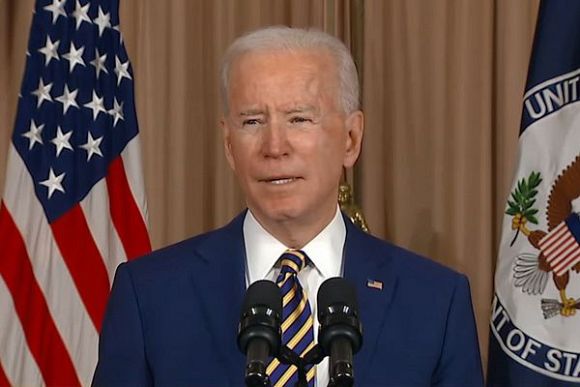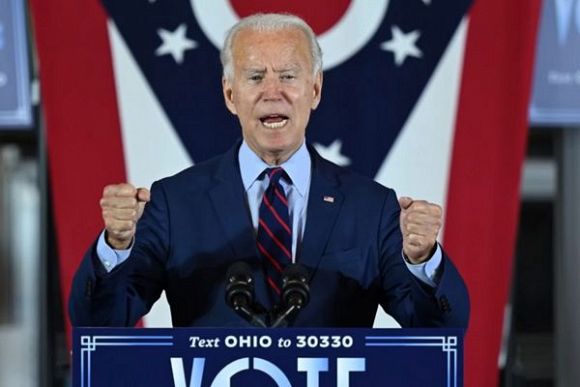President Joe Biden's recent decision to not immediately re-enter the Iran nuclear deal is a continuation of Trump's aggressive stance toward Iran, writes Jesse Ward.
WITH THE BIDEN ADMINISTRATION entering the White House, we saw a reversal of some of former President Donald Trump’s key policies, including the ending of the Muslim travel ban, stopping construction of the border wall, rejoining the Paris climate agreement and a host of other executive orders that affirmed his position as President.
As Biden’s first weeks pass, there’s been a build-up of anticipation around how the President will approach U.S. foreign policy, namely relations with Iran. Under Trump, tensions with Iran escalated dramatically with the decision to pull out of the Iran nuclear deal which was brokered under the Obama-Biden Administration in 2015.
These tensions were put to the test further as the U.S. ordered the assassination of Iran’s top military commander, General Qasem Soleimani, which bought the two countries to what felt like the brink of war. This was layered on top of Trump re-imposing crippling sanctions from the Obama era onto the Iranian economy, with the objective of putting an end to Iran’s oil exports, its main source of income.
As a result, Iranian society has plunged into a dire economy. With skyrocketing inflation and high unemployment rates, access to basic essentials like food and medicine has quickly become a major issue. Even during the pandemic, Trump imposed further sanctions on Iran to prevent the country from getting access to food and medicine, forcing children with particular illnesses to face possible death.
Amid the horror that is the reality Iranians are already living under, COVID-19 has impacted the country the worst in the Middle East, putting a huge strain on the country's healthcare sector and drying up its stockpile of medicine.
Prior to Trump pulling out the Iran nuclear deal, formally known as the Joint Comprehensive Plan of Action (JCPOA), Iran was adhering to the key conditions of the deal, which centred around the country ending its nuclear weapons research program. In exchange for this, the Obama-Biden Administration lifted the sanctions they had imposed on the country’s economy.
In a speech in 2019, while Biden was campaigning, he confirmed this fact and reiterated that he would rejoin the agreement as long as Iran complied with the original conditions of the deal which saw their uranium enrichment program lower its levels to 3.67 per cent.
Now, after the U.S. pulling out of the deal, military tensions escalating in the region and an assassination of a high-ranking general, Iran has decided to increase its uranium enrichment program in intervals based on whether their requests for sanctions to be lifted are met.
This brings us to present day, as Biden and his foreign policy team flag their intentions for how they’ll deal with Iran. These individuals have a colourful history of being war provocateurs and by no means should be looked at for returning any sense of decency or morals to U.S. foreign policy.
In a recent interview with CBS, Biden confirmed that the U.S. will not lift the crippling sanctions on Iran until they stop their uranium enrichment program, which he had to later clarify meant lowering its levels to the agreed 3.67 per cent.
Iran responded by pointing to the fact it was the U.S. who left the deal they were compliant in, and that it’s the U.S. who needs to rebuild trust by returning to their original obligation of lifting sanctions on the country.
When Trump pulled out of the deal, Democrats were appalled at how the move would severely undermine the U.S.’s ability to enter future negotiations with credibility, such as the case with North Korea.
Biden’s decision to not re-enter the Iran deal as it was originally agreed upon by lifting sanctions is stepping all over that shred of credibility in the same fashion. What incentive does Iran have to halt its uranium enrichment program when the U.S. has continued (despite its word) unrelenting economic warfare against the country and scaled up its military’s aggression on its borders.
The devastation of a war with Iran should never be understated. The humanitarian cost of such a war would be disastrous. With over 80 million people living in Iran, the chance of another refuge crisis like the one seen in Syria would be unlike anything we’ve experienced.
Iran has a much more sophisticated army than its neighbours, Afghanistan and Iraq, with ballistic missile capabilities that pose a real danger for escalation. A sound enemy of Iran’s, Israel, holds over 90 nuclear bombs in their arsenal and would be the U.S.’s main ally entering such a war.
While Biden and his foreign policy team continue their hawkish approach toward Iran that Trump reimposed, Iranians continue to face the very real threat of war in an economy that is being suffocated by sanctions every day. Biden's refusal to lift these sanctions is a cruel changing of conditions for the U.S. to re-enter negotiations with a country that never left a deal it was adhering to.
Jesse Ward is a communications professional who has a particular interest in media, international relations and politics. You can follow Jesse on Twitter @jlw93.
Related Articles
- Biden’s foreign policy may be offering more of the same
- Biden talks of ending wars but Cabinet appointments say otherwise
- Biden Administration will start by cleaning up Trump's legacy of hate
- The Biden Presidency will usher in a time for change and Australia should follow
- Joe Biden confirmed: Time to see what Trump will do
 This work is licensed under a Creative Commons Attribution-NonCommercial-NoDerivs 3.0 Australia License
This work is licensed under a Creative Commons Attribution-NonCommercial-NoDerivs 3.0 Australia License
Support independent journalism Subscribe to IA.














